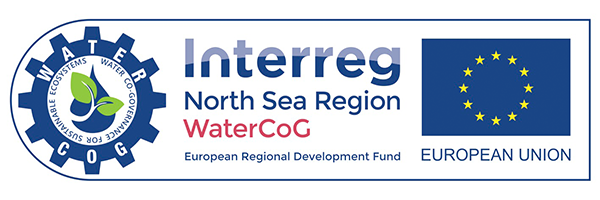
WATER COG – Water Co-Governance for sustainable ecosystems
Project Overview
The focus of the Interreg Water Co-Governance for Sustainable Ecosystems project (WaterCoG) is to understand how the implementation of EU directives can be achieved at a local level in the North Sea Region. WaterCog aims to demonstrate that the implementation and integration of various water management frameworks can be achieved while also providing social, economic and environmental benefits that are currently not being realized. The natural environment is dependent on water to provide society with many essential benefits or “ecosystem services” (e.g. drinking water, biodiversity, food production, recreation, carbon sequestration). A number of EU directives aim to protect and improve the delivery of these services. However, successful implementation and integration of the different directives at a local level is a major shared challenge in the NSR. Understanding how this can be achieved is fundamental to delivering long-term sustainable ecosystem-based management strategies for the NSR and the focus for the WaterCoG project. The project will demonstrate through the adoption of new participatory, ecosystem service based approaches that implementation and integration of different water management frameworks can be achieved at the same time as providing additional social, economic and environmental benefits not currently being realised. A strong transnational component will identify and incorporate common, transferable elements of different approaches into an up-scaling toolbox that will extend the impact of the project and build capacity for delivering improved sustainable management strategies for NSR ecosystems. The projects’ output aims for a change in working practice that will improve the integration between top-down implementation of European and national directives and bottom-up, participatory developed solutions for improving the quality and sustainable management strategies of NSR ecosystems.
Project Results
Expected results include Long term cross sector commitment (sustainability) to co-governance in pilot areas, Target (Unit): 3 Years, Definition: A written commitment from key organisations within each pilot to a partnership agreement, strategy, management plan etc that outlines a co governance approach to managing ecosystems. The aim is for commitments to extend min 3 yrs beyond project term,Indicator: Increased return on public investment by adopting participatory/co-governance approaches to management of NSR ecosystems, Target (Unit): 20 Percentage increase, Definition: Demonstrate Cost Benefit Analysis for the % increase in returns for every euro equivalent of public funding on implementing environmental policy. Measure increase in value of ecosystem services, unlock cross sector investment & deliver direct savings,Indicator: Improvements to the environmental status of pilot areas, Target (Unit): 15 Percentage increase, Definition: Improvements in ecosystem quality or prevention of further deterioration. Target refers to % of water bodies in each pilot site with improved ‘status’. Status is defined & measured according to official classification methodology for relevant EU directive,

